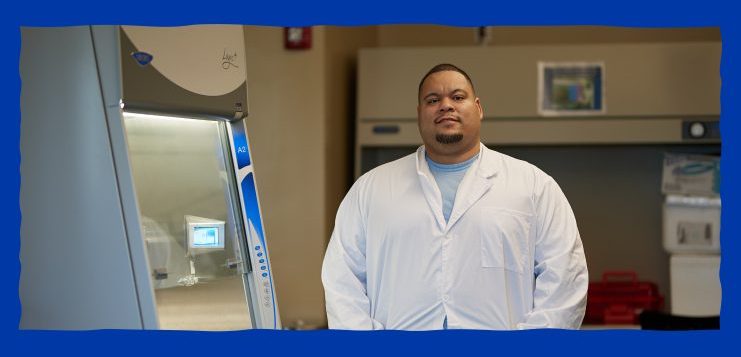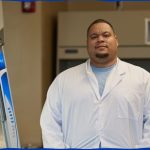Discovering a Passion for a Cure

Brent Lake
Master of Science in Biology
Hometown: Spokane, Washington
Change in life is inevitable. For Brent Lake, a move from the Pacific Northwest to North Carolina brought him closer to family and a focus on pursuing a master’s degree. Lake’s journey to earning the degree included a few stops along the way, all leading to his end goal—destination graduation.
Planting Seeds of Success
Lake’s family served in the United States Air Force. After graduating from Gonzaga Preparatory School in Spokane, Washington, in 2006, he attended the University of Montana Missoula (UM) beginning in 2007. He began as a business major before switching to psychology.
“The recession hit during my junior year,” says Lake. At that point, he made the decision to pause his education.
“Even though I wasn’t in school, I did a lot with the community. I worked with the accessibility challenged population for several years, practiced as an EMT for four years and served as a volunteer fire fighter for a year. At the same time, I was employed with a hospital’s cardiac unit practicing telemetry, which monitors and interprets heart rhythms,” notes Lake. He was also a healthcare tech for six years, a position where he was responsible for patient care, including taking vital signs.
In 2017, Lake decided he wanted to do more and returned to UM, restarting his academic journey as a biology major this time. He admits that when he came back, his disposition changed. “I was older, more mature and treated school like a job. I showed up, did all the work and my GPA rose,” he states.
“I’ve taken the hard road in every sense of the word,” Lake admits. But his fortitude paid off. In May 2020, he graduated from UM with a Bachelor of Science in Biology-Human Biological Sciences concentration, more than a decade after beginning his collegiate journey.
After completing his studies, Lake took a year off and worked remotely as a medical reviewer for an insurance company until 2021. During the same time, his parents relocated from Arizona to Hertford, North Carolina, to be closer to his brother who lives in Suffolk, Va., and serves in the United States Coast Guard. Their move prompted Lake’s desire to be closer to family. In researching where he could continue his studies, he discovered Elizabeth City State University (ECSU).
The Big Comeback
Since Lake began the Master of Science in Biology-Education concentration program in May 2021 at ECSU, “it’s been non-stop,” he says.
As part of his studies, Lake has been in the lab with ECSU faculty, including Hirendra N. Banerjee, Ph.D., professor and chair of the Department of Natural Sciences and director of the National Institutes of Health- Minority Access to Research Careers (MARC) Program.
Banerjee was first introduced to Lake when he entered ECSU in the first cohort of the newly established Robert Noyce Teacher Scholarship Program, a science teacher program funded by the National Science Foundation. “Mr. Lake is a great learner and also a great asset to my lab,” says Banerjee. “He quickly learned all the methodology and difficult techniques of research, such as analysis of RNA sequences. He now helps operate ECSU’s COVID Mitigation Lab. Simultaneously, he has been doing cancer research and we work to find cures for cancer and other chronic diseases.”
A cancer survivor himself, Lake’s research hits home.
“When I was 28-years-old, a tumor was found on my right kidney during a CT scan. It was ‘accidently’ discovered when I was being treated for appendicitis.”
Lake describes his most recent research and the focus of his master’s thesis, “Transcriptomic Changes And Core Canonical Pathways Comparisons In Lung Cancers And A Healthy Lung Cell Line.”
“We’ve been researching a novel pathway found in prostate cancer. We are using the pathway as a guide to determine if it’s present in other cancers, as well as looking at the genes and proteins in the pathway to see their involvement in other cancers. These genes and proteins are found to be dysregulated in different cancers but are not always activated in the same way,” Lake explains. In addition, he examined transcriptomic and proteomic studies and bioinformatics of two different lung cancer types: small cell lung carcinoma and adenocarcinoma lung cancer. “We used bioinformatics and molecular techniques to determine differential gene expression in the lung cancer cell lines compared to healthy lung cell line and by overlaying different activated pathways and found genes that can be used for further research or possible therapeutic targeting,” states Lake.
“I never thought I’d enjoy research until I started doing it. I’m really good at figuring out how machines in the lab work and troubleshooting if the results aren’t on par. I’ve learned every machine and every protocol within six months,” comments Lake.
He aspires to combine his love for patient care and research. “I enjoy the patient interactions and want to make a difference.” Lake applied to Ph.D. programs—some focused on cell and molecular biology and others on cancer research—with hopes of continuing his cancer research. As he awaits next steps, Lake will continue as a research assistant in Banerjee’s lab, where Lake also trains the MARC undergraduate students in lab techniques and protocols, as well as runs ECSU’s COVID Surveillance Testing, specifically PCR testing in local communities.
Asked about his long-term ambitions, Lake replies, “I enjoy teaching and can see myself spending time in academia and conducting research, but I am also thinking of working with a biopharmaceutical company,” Lake notes.
Lake credits his mother and best friends for championing him and his work ethic over the years. His line to career success has been filled with the twists, turns and reflective moments that make for the perfect conclusion—crossing the finish line.


